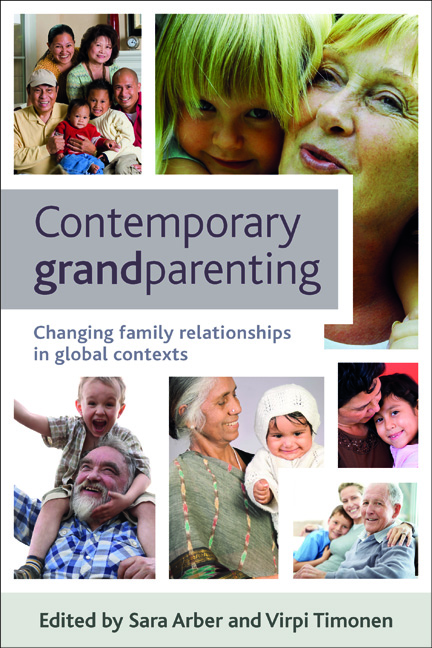eight - Grandparental agency after adult children’s divorce
Published online by Cambridge University Press: 01 September 2022
Summary
Introduction
One of the major social changes that have shaped grandparenting in the modern world is the increased incidence of divorce and separation, both among grandparents themselves and among their adult children. In this chapter, we focus on grandparenting in families where members of the middle (or ‘intermediate’) generation have divorced or separated. Having divorced children is a common experience for older adults in many countries. In the United States, for instance, over half of all parents aged 60 or older with at least one ever-married adult child are estimated to have experienced a child's divorce (Spitze et al, 1994). Grandparents’ roles in divorced and separated families range from intensive co-parenting alongside their divorced son or daughter to situations where they experience a drastic reduction or complete withdrawal of contact with grandchildren. Despite this variation, at the aggregate societal level adult children's divorce is associated with growing downward intergenerational transfers from parents to their divorced or separated adult children (Bengtson, 2001).
Johnson (1985, p 91) posits that grandparents are ‘constrained by the mandate on the autonomy and privacy of the nuclear family in each generation’ and that grandparents’ relationships with their grandchildren ‘ultimately rest on the wishes of their children and children-in-law’. It follows that the quality of the middle generation's relationship with their own parents and parents-in-law is a powerful determinant of the quality of grandparent– grandchild relationships (Johnson and Barer, 1987; Hodgson, 1992). The grandparent–grandchild relationship is therefore ‘mediated’ (Gladstone, 1989) or ‘derived’ (Johnson, 1998, p 188). The power of the middle generation can be accentuated in families following divorce, for instance if the resident parent denies access or makes access to children difficult for the non-resident parent and grandparents. However, Ferguson (2004, p 13) in a study on grandparenting in divorced families in the UK comments that ‘[t]he view that grandparenting is a mediated or derived role needs to be qualified and refined’.
- Type
- Chapter
- Information
- Contemporary GrandparentingChanging Family Relationships in Global Contexts, pp. 159 - 180Publisher: Bristol University PressPrint publication year: 2012



